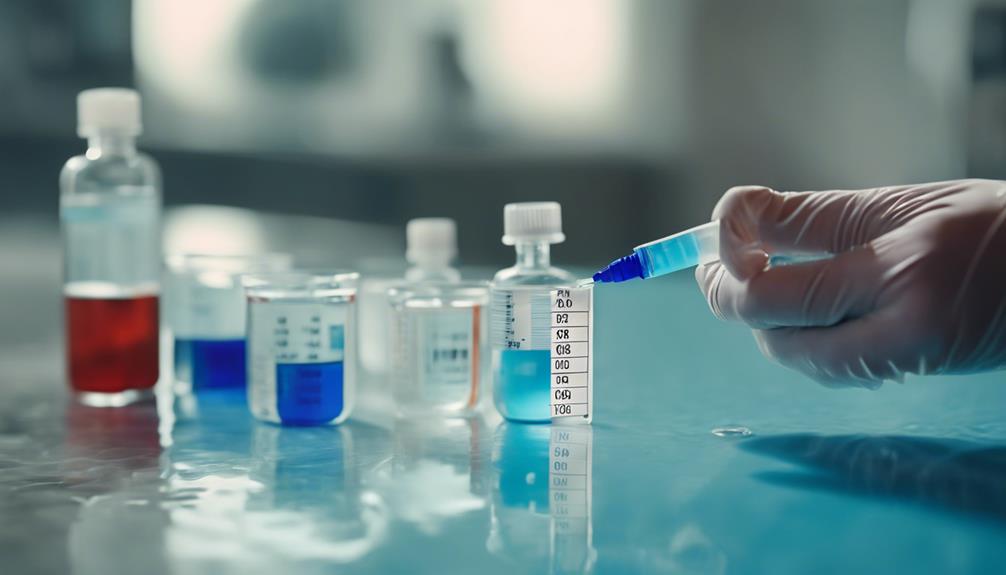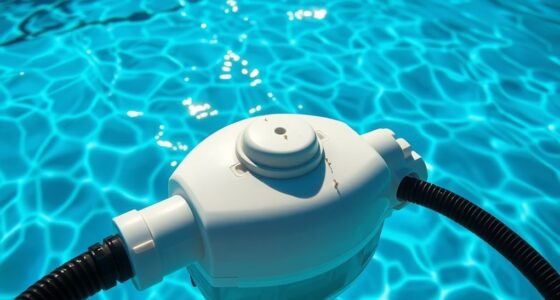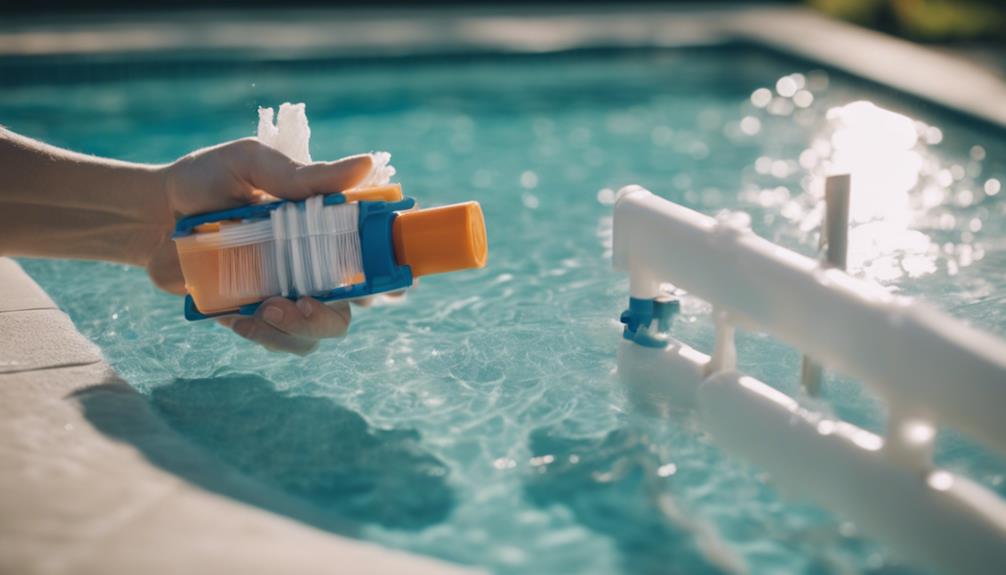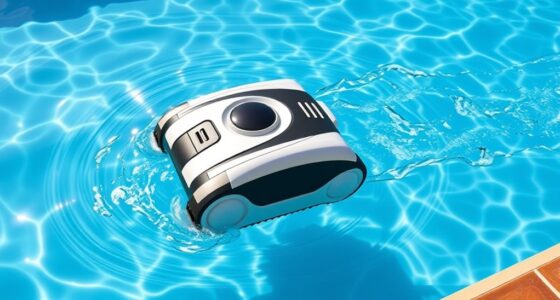To ensure your swimming pool’s calcium hardness is at the proper levels, it is recommended to use a pool water test kit specifically designed for accuracy. Be sure to choose a kit that aligns with the size of your pool and your specific needs. Follow the instructions provided with the kit diligently. The ideal range for calcium hardness levels is between 200-400 ppm. It is crucial to maintain these levels in order to prevent damage and preserve the accessories in your pool. Regularly monitoring the levels is essential. If adjustments are needed, you can add calcium chloride to raise the levels or partially drain and refill to lower them. It is also important to maintain a balanced pH and total alkalinity. By consistently monitoring and adjusting the levels, you will be able to keep your pool in great condition.
Key Takeaways
- Use a pool water test kit to check calcium hardness levels accurately.
- Follow kit instructions for precise results.
- Ideal range is 200-400 ppm for pool health.
- Adjust levels with calcium chloride or water dilution.
- Regular testing and maintenance are crucial for preserving pool condition.
Importance of Calcium Hardness Testing
Regularly testing the calcium hardness of your swimming pool is essential to prevent damage and maintain water balance. The calcium levels in your pool water play a significant role in the overall health of your pool.
High calcium hardness can result in scaling issues, leading to potential damage to your pool surfaces and equipment. On the other hand, low calcium levels can cause erosion, impacting the longevity of your pool.
By testing the calcium hardness of your swimming pool water, you can make sure that it falls within the recommended range of 200-400 ppm, maintaining balanced water and preventing surface deterioration and equipment corrosion.
It's advised to conduct these tests at least monthly or after significant water changes to stay ahead of any potential issues.
Recommended Calcium Hardness Levels

Maintaining the ideal calcium hardness levels between 200 to 400 ppm is vital for the overall health and longevity of your swimming pool. Here are some key points to keep in mind regarding recommended calcium hardness levels:
- Ideal Range: The perfect range for swimming pool calcium hardness falls between 200 to 400 ppm. This range guarantees water balance and prevents potential damage to your pool.
- Preserving Accessories: Proper calcium levels not only uphold water balance but also help protect pool accessories such as ladders and rails.
- Testing Importance: Regularly testing calcium hardness levels is essential to ensure they fall within the recommended range. This allows for timely adjustments to uphold water quality.
- Avoiding Damage: Low calcium hardness levels can lead to damage on metal objects within the pool. By keeping calcium levels within the ideal range, you can prevent such issues and extend the lifespan of your pool equipment.
Using Pool Water Test Kits

When using pool water test kits, select a kit that suits your needs and pool size.
Conduct the test following the kit's instructions carefully to guarantee accurate results.
Test Kit Selection
To accurately measure calcium hardness levels in your swimming pool, selecting the appropriate pool water test kit is essential. When choosing a test kit, consider the following:
- Importance: Opt for a test kit that includes tests specifically designed to determine the calcium hardness in your pool water. This ensures accurate results tailored to your needs.
- Comprehensiveness: Look for a test kit that not only measures calcium hardness but also covers other essential parameters to maintain proper pool water balance.
- Ease of Use: Choose a kit that provides clear and detailed test instructions. This will help you conduct water tests accurately and interpret the results correctly.
- Reliability: Invest in a quality test kit from a reputable brand to ensure dependable results. Quality kits are important for guiding appropriate actions to adjust calcium hardness levels in your pool effectively.
Conducting the Test
Using a reliable pool water test kit, you can accurately measure the calcium hardness levels in your swimming pool. These test kits are designed to provide precise results regarding the calcium hardness in your pool water. By following the instructions included in the kit, you can conduct the test efficiently and effectively.
The test will indicate the calcium hardness level in parts per million (ppm), allowing you to determine if your pool water requires adjustments. Maintaining proper calcium hardness levels between 200-400 ppm is crucial for the overall balance of your pool water.
Regularly testing pool water using these kits guarantees that your pool remains in excellent condition for swimming and helps prevent issues related to low or high calcium hardness levels. Remember, maintaining the right balance of calcium chloride in your pool water is key to enjoying a clean and safe swimming experience.
Interpreting Test Results

When interpreting your calcium hardness test results, keep in mind the ideal levels for pool water fall between 200-400 ppm.
If your levels are below this range, you may need to address low calcium hardness to prevent equipment corrosion.
Conversely, high levels above 400 ppm can result in scaling issues that could damage your pool equipment.
Understanding Ideal Levels
Understanding the ideal levels of calcium hardness in your swimming pool involves interpreting test results to guarantee proper maintenance. To make sure your pool stays in top condition, consider the following key points:
- Ideal Range: The recommended calcium hardness levels for swimming pools typically fall between 200 to 400 parts per million (ppm). This range helps maintain water quality and protects pool surfaces and equipment.
- High Calcium Hardness: Test results showing levels above 400 ppm indicate high calcium hardness. In such cases, appropriate treatment is necessary to prevent scaling issues that can damage your pool.
- Maintaining Levels: Keeping calcium hardness around 300 ppm is a safe approach. This level helps prevent potential damage to pool materials by ensuring proper water balance.
- Preventative Measures: Monitoring and adjusting calcium hardness levels regularly is essential. This practice helps prevent costly damages and ensures the overall health and longevity of your swimming pool.
Addressing Low Levels
To address low calcium hardness levels in your swimming pool, start by examining the results of your water test for proper evaluation. If your test results show calcium hardness levels below 200 ppm, it indicates a need for adjustment.
Low calcium hardness can have critical effects on pool surfaces and equipment, leading to issues such as pitting, etching, and deterioration of pool materials. Balancing calcium hardness is vital to prevent costly damage and maintain proper water chemistry.
Adjusting the calcium hardness levels in your pool will help mitigate these risks and safeguard the longevity of your pool infrastructure. Regular testing and maintenance are essential to address and correct low calcium hardness levels promptly.
Dealing With High Levels
How can you effectively interpret test results indicating high levels of calcium hardness in your swimming pool?
When facing excessive calcium levels, it's important to take immediate action to prevent potential damage to your pool and equipment. Here are some steps to help you manage high calcium hardness in your pool:
- Address the Excess Calcium: Implement proper chemical treatment to reduce calcium hardness levels gradually.
- Monitor Evaporation: Keep an eye on water evaporation rates as they can concentrate calcium in the pool, exacerbating scaling issues.
- Prevent Scaling: Regularly inspect pool surfaces and equipment for signs of scaling caused by high calcium hardness.
- Regularly Test Your Pool: Continuously monitor calcium hardness levels using reliable testing kits to adjust chemical treatments accordingly and maintain a balanced pool environment.
Adjusting Calcium Hardness Levels

Adjust the calcium hardness levels in your swimming pool by following these effective methods.
To increase the calcium hardness, consider adding calcium chloride directly into the pool water. This method helps in raising the calcium hardness levels to the desired range.
On the other hand, if you need to lower the calcium hardness levels, partially draining the pool and refilling it with water lower in hardness can be a suitable solution.
It's essential to maintain proper pH and total alkalinity levels as they can influence the calcium hardness levels. Monitoring these levels and adjusting them accordingly can aid in modifying the overall calcium hardness in your pool.
Remember, draining and refilling the pool with water of different hardness levels is a practical and efficient way to adjust the calcium hardness.
Seek guidance from professionals for safe and effective methods to adjust the calcium hardness levels in your pool.
Maintenance Tips for Optimal Pool Condition

Regularly testing and adjusting your pool water is essential for maintaining peak pool condition. To guarantee your pool stays in top shape, follow these maintenance tips:
- Test Pool Calcium Hardness Monthly: Regular testing of calcium hardness levels (200-400 ppm) is vital to prevent scaling, corrosion, and cloudy water. Maintaining proper calcium levels helps preserve pool water balance and prevents potential damage.
- Prevent Scaling and Corrosion: High calcium hardness can lead to calcium formation on pool surfaces over time. By keeping calcium levels within the recommended range, you can avoid the accumulation of calcium deposits that may harm your pool.
- Regular Water Testing: Consistent water testing and adjustments are key to identifying any issues early on. This proactive approach helps in maintaining the best pool conditions and prevents potential problems before they escalate.
- Monitor for Cloudy Water: Cloudy water can be a sign of imbalanced calcium levels or other water chemistry issues. By addressing cloudy water promptly through proper water testing and treatment, you can ensure your pool remains clear and inviting for swimmers.
Frequently Asked Questions
How Do I Test My Pool for Calcium Hardness?
To test your pool for calcium hardness, use a water hardness test kit with specific reagents. The ideal range is typically 200-400 ppm.
Regular testing, at least once a month, is important to prevent scaling or corrosion issues. Adjusting levels is essential for a balanced pool environment.
Keep in mind that high calcium hardness can lead to scaling, while low levels can cause corrosion in pool surfaces. Regular monitoring is key to maintaining a healthy pool.
How Do I Know if My Pool Has High Calcium?
To determine if your pool has elevated calcium levels, conduct a simple test with specialized kits, readily available at pool supply stores.
By measuring calcium hardness regularly, you can prevent potential issues like scaling, cloudy water, and equipment damage.
Proper maintenance, including balancing calcium levels, is essential to avoid costly repairs and maintain a well-functioning pool.
Stay vigilant in monitoring calcium hardness to preserve the integrity of your pool.
Does Pool Shock Raise Calcium Hardness?
Pool shock doesn't raise calcium hardness levels. The main purpose of pool shock is to sanitize and oxidize the water, not impact calcium content.
Factors like water source quality and evaporation primarily influence calcium hardness. To maintain proper levels, it's important to regularly test and monitor your pool's calcium hardness.
How to Determine Calcium Hardness in Water?
To determine calcium hardness in water, you rely on test kits or strips, measuring in parts per million (ppm).
The ideal range for pool water falls between 200 to 400 ppm. Maintaining this balance prevents costly damage to pool surfaces and equipment.
Regular testing guarantees water chemistry remains ideal for swimming enjoyment.
Be diligent in testing and adjusting calcium hardness levels to keep your pool safe and in top condition.
What is the Impact of Calcium Hardness on Swimming Pool Build-Up?
High calcium hardness levels can lead to the buildup of calcium deposits in swimming pools, causing scaling and cloudy water. Preventing calcium buildup in pool is crucial to maintain water clarity and protect pool surfaces. Regular testing and adjustments of calcium levels can help mitigate these issues and extend the life of the pool.
Conclusion
To sum up, ensuring the proper calcium hardness levels in your swimming pool is essential for maintaining water balance and preventing costly damage. Don't overlook this important aspect of pool maintenance, as it can greatly impact the overall health and longevity of your pool.
Take the time to test and adjust the calcium hardness levels regularly to enjoy a safe and comfortable swimming experience all season long.










